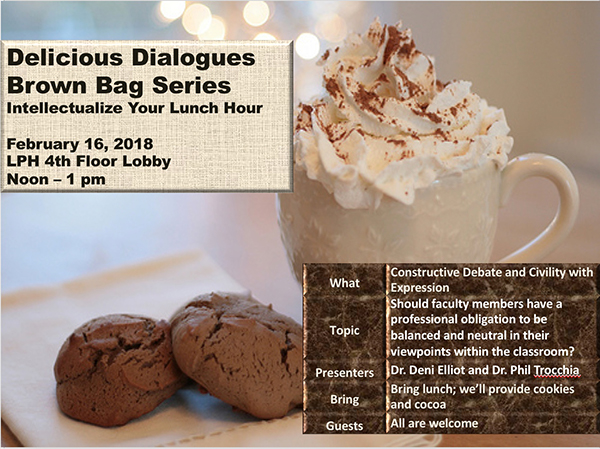By Delaney Brown
In a world of Facebook rants and Twitter arguments, Delicious Dialogues, a moderated luncheon debate, aims to heighten the level of civil discourse.
Students and faculty are welcomed to enjoy hot chocolate and cookies while discussing current events and hot-button topics.
The lunchtime sessions happen once a month and feature two faculty members respectfully exploring opposing arguments on a given topic.
It’s like watching a more polite version of the presidential debates.
Phil Trocchia, a marketing professor in the Kate Tiedemann College of Business, and Deni Elliott, chair of the Department of Journalism and Digital Communication, speak calmly but passionately about lightning rod issues — all while serving as a model of civic behavior.
The speakers change each week and anyone can volunteer to participate or suggest a topic of discussion.
In the most recent session, Trocchia and Elliott discussed whether professors have a professional obligation to remain neutral when discussing viewpoints in the classroom. Trocchia argued for professional neutrality; Elliot, for the need for professors to share their well-informed ideas.
It was a debate unlike those we’ve become accustomed to seeing on television in recent memory.
There were no interruptions, no snide comments and no yelling. The speakers listened to one another, nodded thoughtfully, and even agreed with one another at times. There was no winning or losing, only discussion and understanding.
“The purpose is not to beat your opponent into the ground,” said moderator and mathematics professor Kathleen Gibson-Dee.
Even when the speakers disagreed, they did so cordially.
The commitment to civility extends beyond the debaters. Pamphlets titled “How to Build Bridges, Not Walls, With Your Fellow Student,” and “Ground Rules for Civil Discussion” float around the room, asking viewers to refrain from interrupting, bullying and grandstanding.
Most importantly, the pamphlets asked viewers to listen to understand rather than to respond.
At several points, the debaters stopped to think about what their opponent had said, taking care to learn not only what they think, but why.
“We hope to be planting the seeds and modeling the way to a better future,” said Gibson-Dee. “Being able to discuss complex issues in a civil way is a big part of that.”
Whether the viewers were enticed by the discussion topic, the idea of civil discussion, or the cookies, they were sure to have left with some food for thought.
Header photo courtesy of USF St. Petersburg



